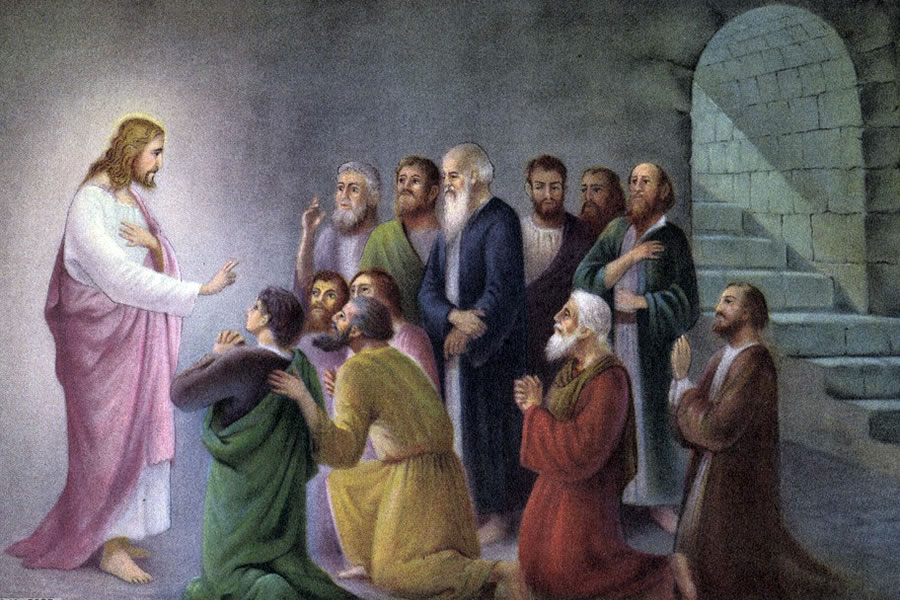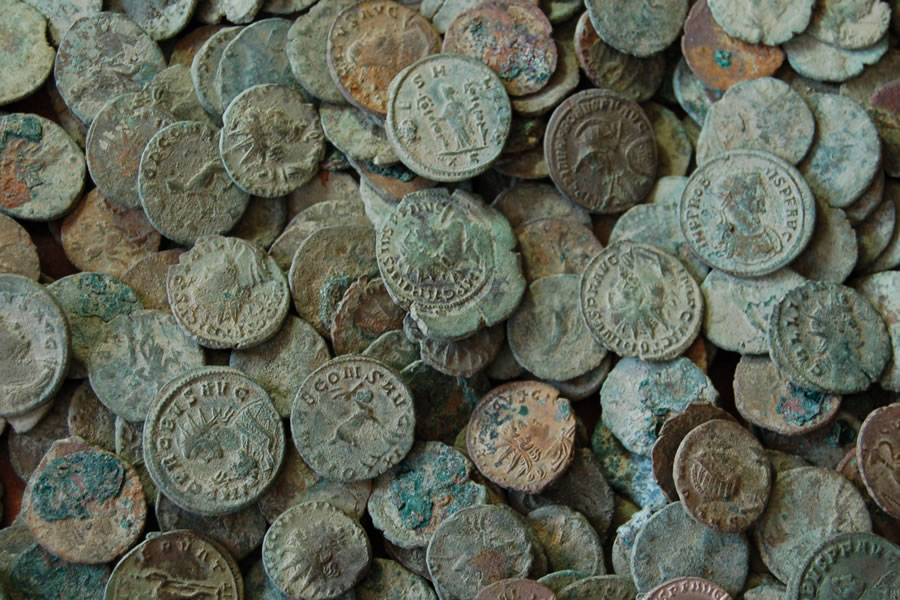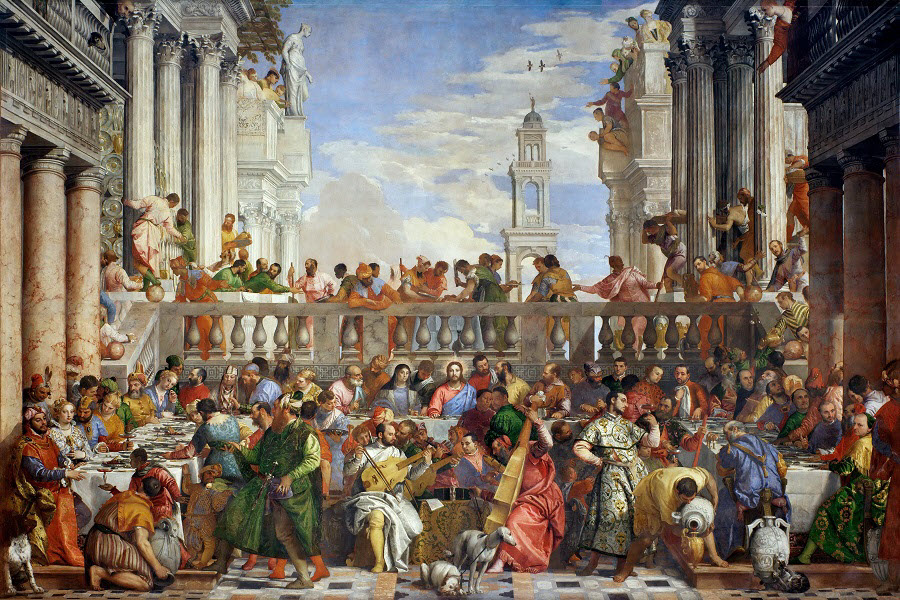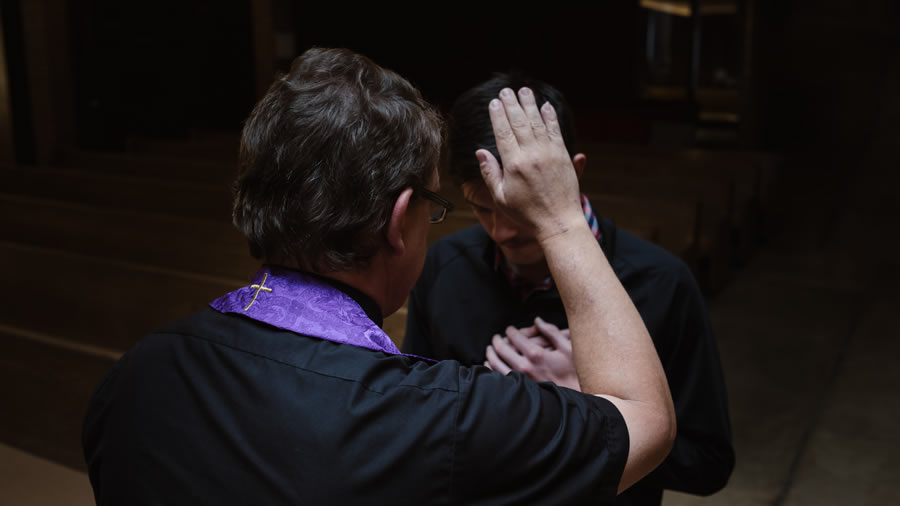St. Francis of Assisi Weekly Reflections

Finding Christ In Others
11-26-2023Weekly ReflectionWe Celebrate Worship Resource, Vol. 48, No. 3In both the first reading and the Gospel, we hear of how shepherds tend their flock, caring for the sick and the lost, eventually judging and separating them. In the first reading from Ezekiel, God is that shepherd, rescuing the sheep from harm, seeking them out when they are lost or strayed, healing them when they are sick or hurt. Throughout his ministry, Jesus was that shepherd—the Good Shepherd—calling his sheep, feeding his sheep, tending his sheep. In today’s Gospel passage, Jesus tells his disciples that they, the sheep, are now to tend one another and that he can be found in the least of their sisters and brothers. We, his disciples, are now the ones who must feed the hungry, welcome the stranger, care for the ill, visit the imprisoned. As we celebrate Christ the King, may we recommit ourselves to our calling so that one day we can face our King, our Good Shepherd, knowing that we have served him in our brothers and sisters in need.
What corporal works of mercy will you do this week? How can you better see the Lord in your neighbor in need?
Encontrando A Cristo En Los Demás
Tanto en la primera lectura como en el Evangelio, escuchamos cómo los pastores cuidan de su rebaño, cuidan de los enfermos y los perdidos, y eventualmente los juzgan y separan. En la primera lectura de Ezequiel, Dios es ese pastor que rescata a las ovejas del mal, las busca cuando están perdidas o descarriadas, las sana cuando están enfermas o heridas. A lo largo de su ministerio, Jesús fue ese pastor—el Buen Pastor—que llamaba a sus ovejas, las alimentaba, las cuidaba. En el pasaje del Evangelio de hoy, Jesús dice a sus discípulos que ellos, las ovejas, ahora deben cuidarse unos a otros y que él se puede encontrar entre sus hermanas y hermanos. Nosotros, sus discípulos, somos ahora quienes debemos alimentar al hambriento, acoger al desconocido, cuidar al enfermo, visitar al encarcelado. Al celebrar a Cristo Rey, que podamos volver a comprometernos con nuestro llamado para que un día podamos enfrentar a nuestro Rey, nuestro Buen Pastor, sabiendo que lo hemos servido en nuestros hermanos y hermanas necesitados.
¿Qué obras de misericordia corporales harás esta semana? ¿Cómo puedes ver mejor al Señor en tu prójimo necesitado?

Are You Prepared?
11-12-2023Weekly ReflectionWe Celebrate Worship Resource, Vol. 48, No. 3Today we hear Jesus compare the kingdom of heaven to ten young women who are responsible for going out to meet the bridegroom when he comes. He is delayed and the lamps of five begin to go out. Desperate for more oil, they leave to buy more just as the bridegroom approaches. Returning with lamps well lit, they discover it’s too late. The door is barred. The lesson: We must always be prepared for the arrival of the kingdom. The five foolish virgins were not. And the door was barred because at the critical time . . . they had left! They did not consider that they might have been welcome, even with lamps that were sputtering out. They missed their chance to meet the Lord because they judged themselves unworthy. The fact is, no matter how wellprepared we are, we are all unworthy. Perhaps those five should have stayed and pleaded for the Lord’s mercy. We have seen the Lord have mercy on those who ask for it. So even as we try to always be prepared, let us take consolation in the words Paul used to reassure those who begin to lose hope due to delay in the Lord’s coming: “[do] not grieve like the rest . . . the dead in Christ will rise” (1 Thessalonians 4:13, 16).
How often do you think that your life on earth may end any day? What gives you comfort when you think that?
¿Estas Listo?
Hoy escuchamos a Jesús comparar el reino de los cielos con diez mujeres jóvenes que son responsables de salir al encuentro del novio cuando él venga. El se retrasa y las lámparas de cinco empiezan a apagarse. Desesperadas por conseguir más aceite, salen a comprar más justo cuando se acerca el novio. Al regresar con las lámparas bien encendidas, descubren que es demasiado tarde. La puerta está cerrada. La lección: Siempre debemos estar preparados para la llegada del reino. Las cinco vírgenes insensatas no lo fueron. Y la puerta estaba cerrada porque en el momento crítico. . . ¡ellas se fueron! No consideraron que podrían haber sido bienvenidos, incluso con las lámparas apagadas. Perdieron la oportunidad de encontrarse con el Señor porque se consideraron indignos. El hecho es que, por muy bien preparados que estemos, todos somos indignos. Quizás esas cinco deberían haberse quedado y suplicar la misericordia del Señor. Hemos visto al Señor tener misericordia de quienes la piden. Así que, aunque tratemos de estar siempre preparados, consolémonos con las palabras que Pablo usó para tranquilizar a aquellos que comienzan a perder la esperanza debido a la demora en la venida del Señor: “no vivan tristes. . . los que murieron en Cristo resucitarán” (1 Tesalonicenses 4:13, 16).
¿Con qué frecuencia piensas que tu vida en la tierra puede terminar cualquier día? ¿Qué te consuela cuando piensas eso?

Whoever Humbles Himself Will Be Exalted
11-05-2023Weekly ReflectionWe Celebrate Worship Resource, Vol. 48, No. 3After criticizing the scribes and the Pharisees for refusing to practice what they preach in today’s Gospel, Jesus not only teaches his disciples how to act, he leaves them with an example of practicing what one preaches that will bear fruit in the most spectacular way in a very short time. Jesus decries those who demand honors and recognition while burdening those they should be serving. Jesus, instead, shoulders the burdens of those he serves. When he knelt down to wash his disciples’ feet, he put into practice the words we hear from him today: “The greatest among you must be your servant” (Matthew 23:11). Then, in dying on the cross and being raised to new life, Jesus accomplished the final line of this passage: “whoever humbles him [or herself] will be exalted” (23:12). Jesus teaches them to proactive what they preach by going out and practicing what he’s preached to the ultimate extent. It is now up to us to be the servant of all, to act humbly, to kneel down to serve those to serve those in need, and to take upon ourselves the burdens of those who suffer. Following Christ demand it.
When have you failed to practice what you preached? What can you do to put your faith into action?
El Que Se Humilla Será Enaltecido
Después de criticar a los escribas y fariseos por negarse a practicar lo que predican en el Evangelio de hoy, Jesús no sólo enseña a sus discípulos cómo actuar, sino que les deja un ejemplo de práctica de lo que se predica que dará frutos de la manera más espectacular en un muy poco tiempo. Jesús condena a quienes exigen honores y reconocimientos mientras agobian a quienes deberían servir. Jesús, en cambio, carga con las cargas de aquellos a quienes sirve. Cuando se arrodilló para lavar los pies de sus discípulos, puso en práctica las palabras que escuchamos de él hoy: “El mayor entre ustedes será su servidor” (Mateo 23:11). Luego, al morir en la cruz y resucitar a una nueva vida, Jesús cumplió la línea final de este pasaje: “el que se humilla será enaltecido” (23:12). Jesús les enseña a ser proactivos en lo que predican saliendo y practicando lo que él predica al máximo. Ahora nos corresponde a nosotros ser servidores de todos, actuar con humildad, arrodillarnos para servir a los necesitados y asumir las cargas de los que sufren. Seguir a Cristo lo exige.
¿Cuándo has dejado de practicar lo que predicabas? ¿Qué puedes hacer para poner tu fe en acción?

You Shall Love The Lord, Your God, With All Your Heart
10-29-2023Weekly ReflectionWe Celebrate Worship Resource, Vol. 48, No. 3Wouldn’t it be wonderful to take a class where the teacher reveals that everything we need to know can be summarized in just two sentences? What an easy final exam that would be! In today’s Gospel, Jesus, our Teacher, does just that, telling the Pharisees—sticklers for all 613 commandments written in the Torah—that all of the law and the prophets depends on just two commandments: “You shall love the Lord, your God, with all your heart, with all your soul, and with all your mind” and “You shall love your neighbor as yourself” (Matthew 22:37, 39). He’s right, of course. If you love God and your neighbor this way, you will want to follow every other command that can be found in either Testament, Old or New. As long as we keep in mind that we all are made in the image and likeness of God, that Jesus chose to redeem us all, and that the Holy Spirit dwells within us all, then we will want to love God and our neighbor with all our strength, for in loving one we are loving both. Jesus gave us the answer and a model. Let us, as Paul says, be imitators of the Lord.
When have you found it difficult to recognize God’s presence in your neighbor? How can you overcome this?
Amarás Al Senor, Tu Dios, Con Todo Tu Corazón
¿No sería maravilloso tomar una clase donde el profesor revele que todo lo que necesitamos saber se puede resumir en sólo dos oraciones? ¡Qué examen final más fácil sería ese! En el Evangelio de hoy, Jesús, nuestro Maestro, hace precisamente eso, dice a los fariseos— rigurosos con los 613 mandamientos escritos en la Torá—que toda la ley y los profetas dependen de sólo dos mandamientos: “Amarás al Señor, tu Dios, con todo tu corazón, con toda tu alma y con toda tu mente” y “Amarás a tu prójimo como a ti mismo” (Mateo 22:37, 39). Tiene razón, por supuesto. Si amas a Dios y a tu prójimo de esta manera, querrás seguir todos los demás mandamientos que se pueden encontrar en el Testamento, ya sea el Antiguo o el Nuevo. Mientras tengamos presente que todos estamos hechos a imagen y semejanza de Dios, que Jesús eligió redimirnos a todos y que el Espíritu Santo habita en todos nosotros, entonces querremos amar a Dios y a nuestro prójimo con toda nuestra fuerza, porque al amar a uno estamos amando a ambos. Jesús nos dio la respuesta y un modelo. Seamos, como dice Pablo, imitadores del Señor.
¿Cuándo te ha resultado difícil reconocer la presencia de Dios en tu prójimo? ¿Cómo puedes superar esto?

Repay To Caesar What Belongs To Caesar...
10-22-2023Weekly ReflectionWe Celebrate Worship Resource, Vol. 48, No. 3“Then repay to Caesar what belongs to Caesar and to God what belongs to God,” Jesus tells his questioners in today’s Gospel, avoiding the trap they had hoped to snare him in (Matthew 22:21). By responding this way Jesus is recognizing that Jewish people have civic obligations that they must honor, even if they oppose the regime that rules over them. They can do this while still worshiping and obeying God. However, God is not repaid in the same way as the state. God does not collect income taxes from us every April 15. There is no divine equivalent to a sales tax or property tax. But what if we thought of the grace we receive from God as something we should repay? How do we repay God for our talents, our life, our redemption? How do we repay God for all that others do for us in God’s name—their service, their assistance, and their prayers? Do we overlook these occasions of grace and fail to realize their ultimate source? In the week ahead, every time we “repay to Caesar” let us consider how God has provided for us and repay God with our gratitude, our sacrifice, and our resolve to extend God’s grace to others.
What can you do today to repay God for what your receive?
Dad A César Lo Que Es Del César...
Dad al César lo que es del César y a Dios lo que es de Dios”, les dice Jesús a sus interlocutores en el Evangelio de hoy, evitando la trampa que le tendieron (Mateo 22:21). Al responder de esta manera Jesús está reconociendo que el pueblo judío tiene obligaciones cívicas que debe honrar, incluso si se oponen al régimen que lo gobierna. Pueden hacer esto sin dejar de adorar y obedecer a Dios. Sin embargo, Dios no recibe la misma recompensa que el Estado. Dios no nos cobra impuestos sobre la renta cada 15 de abril. No existe un equivalente divino a un impuesto sobre las ventas o un impuesto a la propiedad. Pero ¿qué pasaría si pensáramos en la gracia que recibimos de Dios como algo que debemos pagar? ¿Cómo le pagamos a Dios por nuestros talentos, nuestra vida, nuestra redención? ¿Cómo le pagamos a Dios por todo lo que otros hacen por nosotros en su nombre: su servicio, su asistencia y sus oraciones? ¿Pasamos por alto estas ocasiones de gracia y no nos damos cuenta de su fuente última? En la próxima semana, cada vez que “paguemos al César”, consideremos cómo Dios nos ha provisto y paguemos a Dios con nuestra gratitud, nuestro sacrificio y nuestra resolución de extender la gracia de Dios a los demás.
¿Qué puedes hacer hoy para pagarle a Dios por lo que recibes?

Are You Ready for the Feast?
10-15-2023Weekly ReflectionWe Celebrate Worship Resource, Vol. 48, No. 3In the parable in today’s Gospel, Jesus liken the kingdom of heaven to a wedding banquet given by a king (God) for his son (Jesus) - to celebrate the marriage of heaven and earth, if you will. Prophets from Isaiah to John have called the people to repent, to properly prepare themselves for the feast. But many ignored them. Worse, some attacked those who spoke on God’s behalf. In the end, everyone is invited, worthy and unworthy alike, for God’s invitation—and, later, Jesus’ redemption—is offered to everyone. Still, not everyone prepared themselves for this marriage of heaven and earth, for the kingdom of God. They chose not to repent or observe all that God has commanded and Jesus has taught. So they were cast into the darkness while the chosen enjoyed the eternal light of God’s presence. One remarkable aspect of this parable is the persistence of the king. Again and again, even after vehement rejection, he repeated his invitation. In fact, the farmer and the businessman who initially ignored it were probably invited again when the servants gathered all they could find. No matter how we’ve responded in the past, let us listen for God’s persistent invitation today and choose to prepare ourselves for the feast.
What must you change about yourself or your behavior in order to be properly prepared for the kingdom of heaven?
¿Y Tú, Estas Listo Para La Fiesta?
En la parábola del Evangelio de hoy, Jesús comparó el reino de los cielos con un banquete de bodas ofrecido por un rey (Dios) para su hijo (Jesús), para celebrar las bodas del cielo y la tierra, por así decirlo. Los profetas, desde Isaías hasta Juan, han llamado al pueblo al arrepentimiento y a prepararse adecuadamente para la fiesta. Pero muchos los ignoraron. Peor aún, algunos atacaron a quienes hablaban en nombre de Dios. Al final, todos están invitados, dignos e indignos por igual, porque la invitación de Dios (y, más tarde, la redención de Jesús) se ofrece a todos. Aún así, no todos se prepararon para este matrimonio del cielo y la tierra, para el reino de Dios. Eligieron no arrepentirse ni observar todo lo que Dios ha mandado y Jesús ha enseñado. Así que fueron arrojados a la oscuridad mientras los elegidos disfrutaban de la luz eterna de la presencia de Dios. Un aspecto notable de esta parábola es la persistencia del rey. Una y otra vez, incluso después del vehemente rechazo, repitió su invitación. De hecho, el granjero y el empresario que inicialmente lo ignoraron probablemente fueron invitados nuevamente cuando los sirvientes reunieron todo lo que pudieron encontrar. No importa cómo hayamos respondido en el pasado, escuchemos hoy la persistente invitación de Dios y elijamos prepararnos para la fiesta.
¿Qué debes cambiar en ti mismo o en tu comportamiento para estar preparado adecuadamente para el reino de los cielos?

Bearing Fruits For God
10-08-2023Weekly ReflectionWe Celebrate Worship Resource, Vol. 48, No. 3Today we hear Jesus tell a parable of a landowner who takes tender loving care of his vineyard. He tends it, protects it, and watches over it, much as the vineyard owner in Isaiah’s parable does. But at harvesttime his tenants assault those he sends to collect the harvest, even his own son. Jesus must realize how closely this parable will resonate with his own life. He asks the chiefs and the elders what the landowner will do to these tenants. They reply, “He will put those wretched men to a wretched death and lease his vineyard to other tenants who will give him the produce at the proper times” (Matthew 21:41). They are sooo close. They realize these tenants deserve punishment. They know the vineyard needs a proper harvest. But they're missing an essential part. As Jesus will soon say from the cross, “Father, forgive them, they know not what they do” (Luke 23:34). The blood shed in the parable becomes redemptive on the cross. The son rejected by the tenants becomes the cornerstone of our faith. The vineyard—that is, our world and all who are in it—is now entrusted to us. We must give it the tender loving care God desires, so we can produce fruit for God’s kingdom.
What will you do that will bear fruit for others and for God?
Dando Frutos Para Dios
Hoy escuchamos a Jesús contar la parábola de un terrateniente que cuida con ternura y amor su viña. Él la cuida, la protege y la vigila, como lo hace el dueño de la viña en la parábola de Isaías. Pero en el tiempo de la cosecha, sus inquilinos atacaron a quienes envíaron a recoger la cosecha, incluso a su propio hijo. Jesús debe darse cuenta de cuán estrechamente resonará esta parábola con su propia vida. Pregunta a los jefes y a los ancianos qué hará el terrateniente con estos inquilinos. Ellos responden: “Él dará una muerte miserable a esos desdichados y arrendará su viña a otros labradores que le darán el producto a su debido tiempo” (Mateo 21:41). Están muy cerca. Se dan cuenta de que estos inquilinos merecen un castigo. Saben que el viñedo necesita una cosecha adecuada. Pero les falta una parte esencial. Como Jesús pronto dirá desde la cruz: “Padre, perdónalos porque no saben lo que hacen” (Lucas 23:34). La sangre derramada en la parábola se vuelve redentora en la cruz. El hijo rechazado por los inquilinos se convierte en la piedra angular de nuestra fe. La viña, es decir, nuestro mundo y todos los que en él están, ahora nos ha sido confiada. Debemos darle el cuidado tierno y amoroso que Dios desea, para que podamos producir frutos para el reino de Dios.
¿Qué harás que dé frutos para los demás y para Dios?

Which Of The Two Did His Father’s Will?
10-01-2023Weekly ReflectionWe Celebrate Worship Resource, Vol. 48, No. 3In today’s Gospel, two brothers are asked to work in the vineyard. One responds defiantly and the other obediently. But the defiant son changes his mind and ends up doing what his father asked. Perhaps spurred by guilt, perhaps by a moral epiphany, he has a change of heart and obeys. The other son does the exact opposite. Whether he only said yes to get his father off his back or later decided he had better things to do, he does not comply. The chief priests immediately identify the first son as the obedient one, recognizing that actions speak louder than words. But they condemn themselves in the process, for—unlike tax collectors and prostitutes—they fail to put Jesus’ call to repentance into action. Every day, Jesus calls us to repentance, for every day we struggle with our choices. Let us not take refuge in hollow words and then do whatever we want. Rather, let us search our consciences for our sinfulness, root it out, and put God’s will into action. As Ezekiel points out, it is never too late to turn away from sin.
When have you struggled to put your words into action?
¿Cuál De Los Dos Hizo La Voluntad Del Padre?
En el evangelio de hoy se pide a dos hermanos que trabajen en la viña. Uno responde desafiante y el otro obediente. Pero el hijo desafiante cambia de opinión y acaba haciendo lo que le pidió su padre. Quizás impulsado por la culpa, quizás por una epifanía moral, cambia de opinión y obedece. El otro hijo hace exactamente lo contrario. Ya sea que solo haya dicho que sí para quitarse de encima a su padre o que luego haya decidido que tenía mejores cosas que hacer, no cumple. Los principales sacerdotes inmediatamente identifican al primer hijo como el obediente, reconociendo que las acciones hablan más que las palabras. Pero se condenan a sí mismos en el proceso porque, a diferencia de los recaudadores de impuestos y las prostitutas, no ponen en práctica el llamado de Jesús al arrepentimiento. Cada día, Jesús nos llama al arrepentimiento, porque cada día luchamos con nuestras decisiones. No nos refugiemos en palabras huecas y luego hagamos lo que queramos. Más bien, busquemos en nuestra conciencia nuestra pecaminosidad, erradiquémosla y pongamos en práctica la voluntad de Dios. Como señala Ezequiel, nunca es demasiado tarde para alejarse del pecado.
¿Cuándo te ha costado poner tus palabras en acción?

Thanks Be To God
09-24-2023Weekly ReflectionWe Celebrate Worship Resource, Vol. 48, No. 3Do you ever wonder who will make it to heaven? Do you get a little satisfaction in thinking about who won’t? Pay attention to today’s Gospel. Jesus compares the kingdom of heaven to a collection of laborers in a vineyard. All the laborers, whether they worked one hour or the whole long, hot day, are paid the same. There are no pay grades, implying that there are no “levels” of heaven. If we are honest, we might imagine feeling resentful that people who led what appeared to be sinful lives could be awarded the same citizenship of heaven as us. This parable, however, calls us each to be thankful for what we receive from God. Another person’s reward takes nothing away from our own. Besides, we may well be the one who benefits more from God’s extravagance! Isaiah reminds us that God is generous with mercy and God’s ways are beyond our imagination. Let us learn to accept God’s forgiveness for both ourselves and those we consider undeserving.
Can you imitate God’s generosity in the way you regard and forgive those who you feel don’t really deserve it?
Demos Gracias A Dios
¿Alguna vez te preguntaste quién llegará al cielo? ¿Te da un poco de satisfacción pensar en quién no lo hará? Presta atención al evangelio de hoy. Jesús compara el reino de los cielos con un grupo de trabajadores en una viña. Todos los trabajadores, ya sea que hayan trabajado una hora o todo el largo y caluroso día, reciben el mismo salario. No hay niveles salariales, lo que implica que no hay “niveles” del cielo. Si somos honestos, podríamos imaginarnos sentir resentimiento porque personas que llevaron lo que parecían ser vidas pecaminosas pudieran recibir la misma ciudadanía del cielo que nosotros. Esta parábola, sin embargo, nos llama a cada uno de nosotros a estar agradecidos por lo que recibimos de Dios. La recompensa de otra persona no nos quita nada de la nuestra. Además, ¡bien podemos ser nosotros quienes más nos beneficiamos de la extravagancia de Dios! Isaías nos recuerda que Dios es generoso con la misericordia y que sus caminos están más allá de nuestra imaginación. Aprendamos a aceptar el perdón de Dios tanto para nosotros como para aquellos que consideramos indignos.
¿Puedes imitar la generosidad de Dios en la forma en que consideras y perdonas a quienes crees que realmente no lo merecen?

Seek Forgiveness
09-17-2023Weekly ReflectionWe Celebrate Worship Resource, Vol. 48, No. 3Peter sounds like a child pleading with a parent or teacher in today’s Gospel: How many times do I need to forgive someone? Surely not as many as seven times? Imagine his shock when Jesus answers no: seventy-seven times. If seven symbolizes completion, as when God created the world, seventy-seven suggests that completion isn’t really the goal at all. Forgiveness should be thought of as an attitude of the heart, not a scorecard to be filled in. Jesus tells Peter a parable. A servant is so deep in debt that all his property, and worse, all his family, are to be sold to pay it. But the king is so moved with compassion that he forgives the entire debt, allowing the servant and his family to begin anew. This is the forgiveness we each received from the cross. This is the forgiveness God continues to offer us day after day. This is the forgiveness we are called to grant to our sisters and brothers. This kind of forgiveness frees the forgiven from the burdens of sin and guilt, and it also frees the forgiver from the corrosive effects of wrath and anger, which fester into resentment and prevent reconciliation. May the forgiveness we receive from the Lord inspire us to extend the same forgiveness to others, without condition, without limit.
Whom do you need to forgive? For what do you seek forgiveness today?
Busca El Perdon
Pedro suena como un niño suplicando a un padre o maestro en el Evangelio de hoy: ¿Cuántas veces necesito perdonar a alguien? ¿Seguramente no hasta siete veces? Imagine su sorpresa cuando Jesús responde que no: setenta veces siete . Si siete simboliza la finalización, como cuando Dios creó el mundo, setenta veces siete sugiere que la finalización no es realmente la meta en absoluto. Se debe pensar en el perdón como una actitud del corazón, no como una tarjeta de puntuación que hay que rellenar. Jesús le cuenta a Pedro una parábola. Un sirviente está tan endeudado que todas sus propiedades, y peor aún, toda su familia, deben venderse para pagarlas. Pero el rey siente tanta compasión que perdona toda la deuda, permitiendo que el sirviente y su familia comiencen de nuevo. Este es el perdón que cada uno de nosotros recibimos en la cruz. Este es el perdón que Dios continúa ofreciéndonos día tras día. Éste es el perdón que estamos llamados a conceder a nuestras hermanas y hermanos. Este tipo de perdón libera al perdonado de las cargas del pecado y la culpa, y también libera al perdonador de los efectos corrosivos de la ira y el enojo, que se convierten en resentimiento e impiden la reconciliación. Que el perdón que recibimos del Señor nos inspire a extender el mismo perdón a los demás, sin condición, sin límite.
¿A quién necesitas perdonar? ¿Para qué buscas perdón hoy?

Love Your Neighbor
09-10-2023Weekly ReflectionWe Celebrate Worship Resource, Vol. 48, No. 3Jesus appears to suggest an intervention in today’s Gospel. In our day, an intervention takes place when a group of people who love someone who is addicted to alcohol or drugs, having failed individually to persuade that person to quit, join together to persuade their loved one. They do it because they realize that addiction is a disease and that it requires extraordinary effort to overcome, and because they care dearly for their friend. In today’s Gospel, Jesus tells his disciples that if a sinner will not listen to one person alone, that one can gather others, and together, they can intervene and persuade the sinner to repent. We can think of it as an intervention, done with the understanding that our friend’s judgment is likely clouded, with the intention of encouraging change, and most of all, with love. At least we’re not in Ezekiel’s position, given the task of intervening for the entire population of Israel! Paul reminds the Romans that all God’s laws are fulfilled by loving your neighbor as yourself. May we show love for our neighbor by helping them turn away from sin, and may we recognize the love in others who see to help us turn away from our own.
How can God work through you to help others recover? How can you respond with love to someone who confronts you?
Ama Al Prójimo
Jesús parece sugerir una intervención en el evangelio de hoy. En nuestros días, se produce una intervención cuando un grupo de personas que aman a alguien adicto al alcohol o a las drogas, al no haber logrado persuadir individualmente a esa persona para que deje de fumar, se unen para persuadir a su ser querido. Lo hacen porque se dan cuenta de que la adicción es una enfermedad y que requiere un esfuerzo extraordinario para superarla, y porque se preocupan mucho por su amigo. En el Evangelio de hoy, Jesús les dice a sus discípulos que si un pecador no escucha a una sola persona, uno puede reunir a otros y juntos pueden intervenir y persuadir al pecador a arrepentirse. Podemos pensar en ello como una intervención, hecha con el entendimiento de que el juicio de nuestro amigo probablemente esté nublado, con la intención de fomentar el cambio y, sobre todo, con amor. ¡Al menos no estamos en la posición de Ezequiel, dada la tarea de intervenir por toda la población de Israel! Pablo recuerda a los romanos que todas las leyes de Dios se cumplen amando al prójimo como a uno mismo. Que podamos mostrar amor a nuestro prójimo ayudándolo a alejarse del pecado, y que reconozcamos el amor en otros que buscan ayudarnos a alejarnos del nuestro.
¿Cómo puede Dios obrar a través de usted para ayudar a otros a recuperarse? ¿Cómo puedes responder con amor a alguien que te confronta?

Take Up Your Cross
09-03-2023Weekly ReflectionWe Celebrate Worship Resource, Vol. 48, No. 3Before he began his ministry, Jesus endured forty days of testing in the desert, coming to terms with his mission. The devil tempted him by enticing him in ways that would have eased his suffering, but Jesus refused, exclaiming “Get away, Satan!” (Matthew 4:10). As painful and horrifying as his cross is, it is the reason Jesus is here. Refusing or avoiding it places an obstacle to fulfilling his mission. Jesus’ commitment is like the fire of prophecy burning in Jeremiah’s heart. No matter how much hatred and reproach Jeremiah received, he could not help but speak out in God’s name. Paul, who was also persecuted for his preaching, encouraged Christians to offer themselves as a living sacrifice to God’s will. Our crosses may not be as harsh or heavy as theirs, but is recognizing our own mission and uniting our suffering with Jesus’, we too can be fired up to carry them willingly.
What motivates you to carry your cross? When have you felt satisfaction or reward in suffering?
Toma Tu Cruz
Antes de comenzar su ministerio, Jesús soportó cuarenta días de prueba en el desierto hasta llegar a un acuerdo con su misión. El diablo lo tentó seduciéndolo de maneras que habrían aliviado su sufrimiento, pero Jesús se negó y exclamó: “¡Aléjate, Satanás!” (Mateo 4:10). Por muy dolorosa y horripilante que sea su cruz, es la razón por la que Jesús está aquí. Negarlo o evitarlo supone un obstáculo para el cumplimiento de su misión. El compromiso de Jesús es como el fuego de la profecía que arde en el corazón de Jeremías. No importa cuánto odio y reproche recibió Jeremías, no pudo evitar hablar en el nombre de Dios. Pablo, que también fue perseguido por su predicación, animó a los cristianos a ofrecerse como sacrificio vivo a la voluntad de Dios. Nuestras cruces pueden no ser tan duras o pesadas como las de ellos, pero si reconocemos nuestra propia misión y unimos nuestro sufrimiento al de Jesús, nosotros también podemos animarnos a llevarlas voluntariamente.
¿Qué te motiva a cargar tu cruz? ¿Cuándo has sentido satisfacción o recompensa en el sufrimiento?